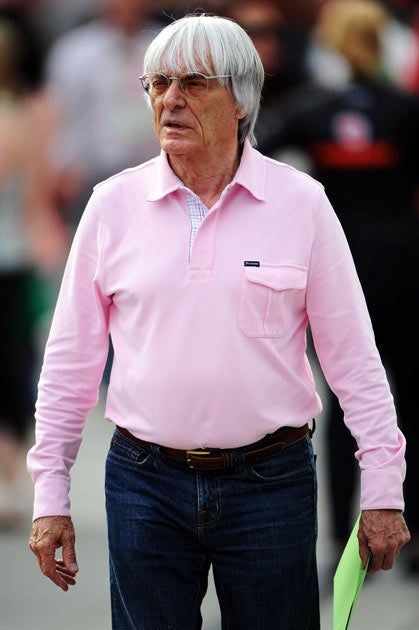Ecclestone faces new legal threat over Formula 1 sale

Your support helps us to tell the story
From reproductive rights to climate change to Big Tech, The Independent is on the ground when the story is developing. Whether it's investigating the financials of Elon Musk's pro-Trump PAC or producing our latest documentary, 'The A Word', which shines a light on the American women fighting for reproductive rights, we know how important it is to parse out the facts from the messaging.
At such a critical moment in US history, we need reporters on the ground. Your donation allows us to keep sending journalists to speak to both sides of the story.
The Independent is trusted by Americans across the entire political spectrum. And unlike many other quality news outlets, we choose not to lock Americans out of our reporting and analysis with paywalls. We believe quality journalism should be available to everyone, paid for by those who can afford it.
Your support makes all the difference.Formula One boss Bernie Ecclestone has said that a lawsuit, filed against him over the sale of the sport to private equity firm CVC, is an empty threat designed to put pressure on him.
Constantin Medien, a former part-owner of F1, filed the lawsuit last month just days after Mr Ecclestone was accused by German prosecutors of paying a $44m (£27m) bribe to allegedly get the sport undervalued when it was sold to CVC in 2006. Mr Ecclestone denies the accusation, but the two events are closely connected.
In 2000 and 2001 Constantin, then known as EM.TV, bought a 75 per cent stake in F1's parent company SLEC before coming close to collapse during the recession over the following years. It was saved by another German media company, Kirch, which bought 58.3 per cent of EM.TV's stake in F1 using a $1.6bn loan from three banks: BayernLB, JP Morgan and Lehman Brothers.
Kirch itself went bankrupt in 2002 and the banks took over its F1 shares, on which their loans were secured. EM.TV then agreed to sell to the banks the 16.7 per cent stake it had been left with. The stake had a balance sheet value of €204m (£180m). But, according to company documents seen by The Independent, it was sold for just €8.5m on condition that when the banks sold the combined 75 per cent, the media firm would receive "a part interest in the surplus exceeding the amount loaned".
Writing down its F1 stake by €195.8m led to EM.TV recording a €310m net loss in 2002. As it turned out, four years later CVC eventually bought F1 at a price that netted EM.TV nothing. Constantin's lawsuit now alleges that was because Mr Ecclestone contrived to have the business sold on the cheap.
However, Mr Ecclestone described the $1.7bn paid by CVC as "a very good price". He added: "They didn't buy the shares under value, it was the opposite... four or five proper people offered considerably less... there could have been a big bust-up with the teams. It was so close it was easy to happen."
Mr Ecclestone said a Constantin board member had pushed for the lawsuit in the hope he would settle out of court. "The shares were not undervalued and who knows what they were worth? That's the whole point."
Constantin and its representative, Keith Oliver of Peters & Peters, declined to comment on the matter.
Join our commenting forum
Join thought-provoking conversations, follow other Independent readers and see their replies
Comments